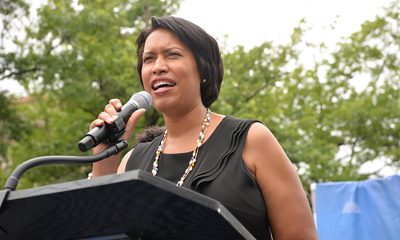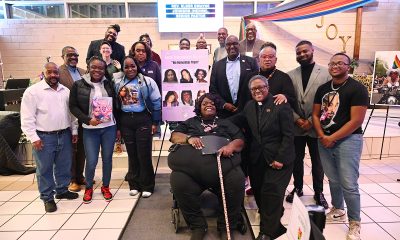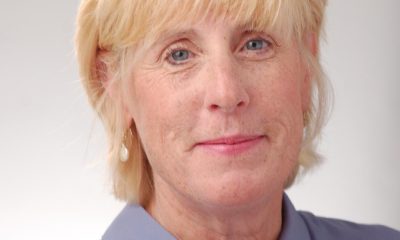Local
D.C. has marriage, so now what?
Despite successes, activists say ‘we have not overcome yet’

Aisha Mills, president of the Campaign for All D.C. Families, said LGBT activists cannot ‘rest on our laurels’ despite recent successes. (Washington Blade photo by Michael Key)
When the weddings for same-sex couples began in the District of Columbia on March 9, many in the community hailed the occasion as the capstone of the city’s decades-old LGBT rights movement.
The District government’s enactment of a same-sex marriage law in December and Congress’s decision not to stop it follows a long list of existing city laws and policies that protect LGBT people from discrimination, some of which were approved more than 30 years ago.
With this as a backdrop, some in the community wondered whether the same-sex marriage law marked the completion of the LGBT rights movement within the city, enabling activists to move on to other causes and endeavors.
But an informal Washington Blade survey of local LGBT activists conducted over the past two weeks shows that virtually all those contacted believe a wide range of LGBT-related problems and concerns remain on the agenda of local advocacy groups.
“There’s still so much work to be done,” said veteran D.C. gay and Ward 8 community activist Phil Pannell. “We have not overcome yet.”
Pannell and others involved with local LGBT organizations pointed to alarmingly high rates of HIV infection among D.C. men who have sex with men, the city’s unwelcome status of having the nation’s highest rate of reported anti-LGBT hate crimes, and its distinction of being one of the few major U.S. cities that fails to provide ongoing city funds for its LGBT community center.
The same contingent of activists expressed caution that the fight for same-sex marriage in the city is not yet over. They noted that a lawsuit seeking to force the city to hold a voter initiative calling for repealing the law is scheduled to come up for a hearing May 4 before the D.C. Court of Appeals.
City attorneys, who have already won several earlier court challenges to the marriage law, say they are optimistic the city will ultimately win its case in defending a provision of its initiative and referendum law that bans ballot measures seeking to take away rights from minority groups.
That law, which gay activists persuaded the City Council to pass in the late 1970s, has so far spared the city a divisive ballot fight over gay marriage that has rocked other states, including California and Maine.
“We still have to stay vigilant and make sure we are actively monitoring what will come down through the courts,” said Aisha Mills, president of the Campaign for All D.C. Families, one of the lead groups that lobbied for the city’s same-sex marriage law.
“And we also know that Congress still has an opportunity to get involved and intervene in D.C. in a number of ways,” she said, pointing to Congress’s authority to overturn a D.C. law at any time, including through its process of approving the city’s annual appropriations bill.
“We are not going to be able to rest on our laurels and be safe and secure in having marriage at least, I would say, for another year or two or even longer,” she said.
Veteran D.C. gay activist Bob Summersgill, who is credited with mapping the strategy for passing a same-sex marriage law, said he, too, is hopeful that a ballot measure seeking to repeal the law will be defeated in court. However, he noted that Congress could always exert its authority to force the city to put the issue before the voters.
“The Democrats will not hold both houses [of Congress] forever, and it is unlikely that any Republicans will back marriage equality in D.C. if they gain a majority,” Summersgill said. “The longer that they are put off, the safer we are, but we must be prepared to fight a ballot initiative.”
On other matters, Summersgill and Rick Rosendall, vice president of the Gay & Lesbian Activists Alliance, point to GLAA’s 21-page 2008 LGBT Agenda, or policy paper for D.C., which describes a wide range of issues that the group believes are related to gay, lesbian, bisexual and transgender city residents.
Rosendall said the group is updating the Agenda document in time to present it to candidates running in this year’s mayoral and City Council races.
“Marriage equality is only part of one of six sections in our policy paper,” Rosendall said.
In addition to addressing LGBT families, Rosendall said the document lists LGBT-related concerns over public safety, including the Police and Fire and Emergency Medical Services Departments and the Department of Corrections; public health, including AIDS; human and civil rights; education and youth; and consumer and business issues.
“Even if we achieve equality on paper — and we have a long way to go in some of these areas — continued vigilance is required to ensure that good policies are put into practice,” he said.
Among the specific issues addressed in the document are bullying of LGBT youth in the city’s public schools “while adult authority figures often look the other way,” lack of social services for transgender residents, and a local health care system that doesn’t sufficiently serve lesbians.
The GLAA Agenda document is available online at the organization’s web site, glaa.org.
Lesbian Democratic activist Barbara Helmick cited a litany of issues similar to those raised in the GLLA Agenda document, but said that local activists should go a step further by joining others in the community to push for changes in federal law.
Of particular concern to same-sex married couples, she said, is the existing federal law barring them from obtaining Social Security spousal benefits given to straight married couples.
“I think with our unique seat right here with the federal government down the street, the local community becoming active in that campaign would have enormous benefits for many of our married couples here in the city as well as married couples throughout the country,” she said.
David Mariner, executive director of the D.C. LGBT Community Center, said many of the LGBT-related social services programs that groups like GLAA seek to improve are performed in other cities by LGBT community centers.
Pointing to a call by activists in Philadelphia for “brick and mortar” projects and programs for LGBT youth, seniors and other vulnerable populations, Mariner said the D.C. LGBT Center has the ability to house or operate such programs if the city helps fund the center.
“We are the only major U.S. city that doesn’t have a permanent building for our local LGBT Community Center,” Mariner said. “In our short time at 1810 14th St., N.W., we’ve seen what is possible when we have an appropriate facility. Unfortunately, we will have to leave this facility, possibly as soon as this summer, and our future is uncertain.”
Mariner was referring to a lease the Center has for a building formerly used by the Whitman-Walker Clinic. The building is owned by a real estate development company that plans to demolish it to build a new condominium and office complex. The Washington Blade offices also are located in the building.
Brian Watson, director of programs for the non-profit social services group Transgender Health Empowerment, and longtime transgender activist Earline Budd, an outreach worker for the group, both said the community’s work in addressing transgender issues is far from complete.
The two pointed to the organization’s Wanda Alston House for LGBT youth, which provides temporary housing and social services to gay and trans youth. Due to city budget cuts, the Alston House lost a sizable portion of its city funding, requiring THE to reduce services to the youth staying at the house.
“Homelessness in our community is mostly invisible,” Budd said. “One of my priorities for our movement is to find out how we can reach the social and economically disadvantaged in our community.”
Gay Democratic activist Peter Rosenstein said an important part of the community’s continuing agenda should be making sure the mayor and city agencies properly implement LGBT-related laws and policies already on the books. He noted that agencies such as the public school system haven’t been aggressive enough in carrying out anti-bullying polices, for example.
“We may also need to legislate action” requiring the agencies to better carry out such programs, he said.
Carlene Cheatam, a same-sex marriage advocate and longtime member of the D.C. Coalition of Black Lesbian, Gay, Bisexual & Transgender Men & Women before recently stepping aside from the group, called for a fundamental change in the LGBT movement’s approach on the local level.
Instead of working mostly within specific LGBT groups that limit their work to LGBT-specific issues, Cheatam said activists should become fully involved in their local communities and integrate LGBT advocacy into the broader community.
“I have always thought that the community does it wrong,” she said. “I feel the community does it separate from other issues and the broader community. … You can’t just go to the straight community and say let’s talk about LGBT.”
She said a small number of LGBT people who are involved in their local communities work on broader, non-LGBT issues as well as LGBT issues.
“But as an agenda, the community does not get involved in something that’s not LGBT,” she said. “And yet we expect our allies to support us. … And so what I want is for the LGBT community to become part of the broader community and participate, support other people, other communities to establish allies.”
Cheatam also said that LGBT people who take a low profile in their involvement in the broader community should be fully out and self identified as LGBT.
“This also helps other people who are in the closet to see LGBT [people] who are visible, who are cleaning up neighborhood alleys with the gay T-shirt on. You can see that from your window and say, ‘Wow, they’re able to be out and in the neighborhood.’
“That’s my wish for the community.”
District of Columbia
D.C. police arrest man for burglary at gay bar Spark Social House
Suspect ID’d from images captured by Spark Social House security cameras

D.C. police on Feb. 18 arrested a 63-year-old man “of no fixed address” for allegedly stealing cash from the registers at the gay bar Spark Social House after unlawfully entering the bar at 2009 14th St., N.W., around 12:04 a.m. after it had closed for business, according to a police incident report.
“Later that day officers canvassing for the suspect located him nearby,” a separate police statement says. “63-year-old Tony Jones of no fixed address was arrested and charged with Burglary II,” the statement says.
The police incident report states that the bar’s owner, Nick Tsusaki, told police investigators that the bar’s security cameras captured the image of a man who has frequently visited the bar and was believed to be homeless.
“Once inside, the defendant was observed via the establishment’s security cameras opening the cash register, removing U.S. currency, and placing the currency into the left front pocket of his jacket,” the report says.
Tsusaki told the Washington Blade that he and Spark’s employees have allowed Jones to enter the bar many times since it opened last year to use the bathroom in a gesture of compassion knowing he was homeless. Tsusaki said he is not aware of Jones ever having purchased anything during his visits.
According to Tsusaki, Spark closed for business at around 10:30 p.m. on the night of the incident at which time an employee did not properly lock the front entrance door. He said no employees or customers were present when the security cameras show Jones entering Spark through the front door around 12:04 a.m.
Tsusaki said the security camera images show Jones had been inside Spark for about three hours on the night of the burglary and show him taking cash out of two cash registers. He took a total of $300, Tsusaki said.
When Tsusaki and Spark employees arrived at the bar later in the day and discovered the cash was missing from the registers they immediately called police, Tsusaki told the Blade. Knowing that Jones often hung out along the 2000 block of 14th Street where Spark is located, Tsusaki said he went outside to look for him and saw him across the street and pointed Jones out to police, who then placed him under arrest.
A police arrest affidavit filed in court states that at the time they arrested him police found the stolen cash inside the pocket of the jacket Jones was wearing. It says after taking him into police custody officers found a powdered substance in a Ziploc bag also in Jones’s possession that tested positive for cocaine, resulting in him being charged with cocaine possession in addition to the burglary charge.
D.C. Superior Court records show a judge ordered Jones held in preventive detention at a Feb. 19 presentment hearing. The judge then scheduled a preliminary hearing for the case on Feb. 20, the outcome of which couldn’t immediately be obtained.
District of Columbia
Judge rescinds order against activist in Capital Pride lawsuit
Darren Pasha accused of stalking organization staff, board members, volunteers

A D.C. Superior Court judge on Feb.18 agreed to rescind his earlier ruling declaring local gay activist Darren Pasha in default for failing to attend a virtual court hearing regarding an anti-stalking lawsuit brought against him by the Capital Pride Alliance, the group that organizes D.C.’s annual Pride events.
The Capital Pride lawsuit, initially filed on Oct. 27, 2025, accuses Pasha of engaging in a year-long “course of conduct” of “harassment, intimidation, threats, manipulation, and coercive behavior” targeting Capital Pride staff, board members, and volunteers.
In his own court filings without retaining an attorney, Pasha has strongly denied the stalking related allegations against him, saying “no credible or admissible evidence has been provided” to show he engaged in any wrongdoing.
Judge Robert D. Okum nevertheless on Feb. 6 approved a temporary stay-away order requiring Pasha to stay at least 100 feet away from Capital Pride’s staff, volunteers, and board members until the time of a follow-up court hearing scheduled for April 17. He reduced the stay-away distance from 200 yards as requested by Capital Pride.
In his two-page order issued on Feb. 18, Okun stated that Pasha explained that he was involved in a scooter accident in which he was injured and his phone was damaged, preventing him from joining the Feb. 6 court hearing.
“Therefore, the court finds there is a good cause for vacating the default,” Okun states in his order.
At the time he initially approved the default order at the Feb. 6 hearing that Pasha didn’t attend, Okun scheduled an April 17 ex parte proof hearing in which Capital Pride could have requested a ruling in its favor seeking a permanent anti-stalking order against Pasha.
In his Feb. 18 ruling rescinding the default order Okun changed the April 17 ex parte proof hearing to an initial scheduling conference hearing in which a decision on the outcome of the case is not likely to happen.
In addition, he agreed to consider Pasha’s call for a jury trial and gave Capital Pride 14 days to contest that request. The Capital Pride lawsuit initially called for a non-jury trial by judge.
One request by Pasha that Okum denied was a call for him to order Capital Pride to stop its staff or volunteers from posting information about the lawsuit on social media. Pasha has said the D.C.-based online blog called DC Homos, which Pasha claims is operated by someone associated with Capital Pride, has been posting articles portraying him in a negative light and subjecting him to highly negative publicity.
“The defendant has not set forth a sufficient basis for the court to restrict the plaintiff’s social media postings, and the court therefore will deny the defendant’s request in his social media praecipe,” Okun states in his order.
A praecipe is a formal written document requesting action by a court.
Pasha called the order a positive development in his favor. He said he plans to file another motion with more information about what he calls the unfair and defamatory reports about him related to the lawsuit by DC Homos, with a call for the judge to reverse his decision not to order Capital Pride to stop social media postings about the lawsuit.
Pasha points to a video interview on the LGBTQ Team Rayceen broadcast, a link to which he sent to the Washington Blade, in which DC Homos operator Jose Romero acknowledged his association with Capital Pride Alliance.
Capital Pride Executive Director Ryan Bos didn’t immediately respond to a message from the Blade asking whether Romero was a volunteer or employee with Capital Pride.
Pasha also said he believes the latest order has the effect of rescinding the temporary stay away order against him approved by Okun in his earlier ruling, even though Okun makes no mention of the stay away order in his latest ruling. Capital Pride attorney Nick Harrison told the Blade the stay away order “remains in full force and effect.”
Harrison said Capital Pride has no further comment on the lawsuit.
District of Columbia
Trans activists arrested outside HHS headquarters in D.C.
Protesters demonstrated directive against gender-affirming care

Authorities on Tuesday arrested 24 activists outside the U.S. Department of Health and Human Services headquarters in D.C.
The Gender Liberation Movement, a national organization that uses direct action, media engagement, and policy advocacy to defend bodily autonomy and self-determination, organized the protest in which more than 50 activists participated. Organizers said the action was a response to changes in federal policy mandated by Executive Order 14187, titled “Protecting Children from Chemical and Surgical Mutilation.”
The order directs federal agencies and programs to work toward “significantly limiting youth access to gender-affirming care nationwide,” according to KFF, a nonpartisan, nonprofit organization that provides independent, fact-based information on national health issues. The executive order also includes claims about gender-affirming care and transgender youth that critics have described as misinformation.
Members of ACT UP NY and ACT UP Pittsburgh also participated in the demonstration, which took place on the final day of the public comment period for proposed federal rules that would restrict access to gender-affirming care.
Demonstrators blocked the building’s main entrance, holding a banner reading “HANDS OFF OUR ‘MONES,” while chanting, “HHS—RFK—TRANS YOUTH ARE NO DEBATE” and “NO HATE—NO FEAR—TRANS YOUTH ARE WELCOME HERE.”
“We want trans youth and their loving families to know that we see them, we cherish them, and we won’t let these attacks go on without a fight,” said GLM co-founder Raquel Willis. “We also want all Americans to understand that Trump, RFK, and their HHS won’t stop at trying to block care for trans youth — they’re coming for trans adults, for those who need treatment from insulin to SSRIs, and all those already failed by a broken health insurance system.”
“It is shameful and intentional that this administration is pitting communities against one another by weaponizing Medicaid funding to strip care from trans youth. This has nothing to do with protecting health and everything to do with political distraction,” added GLM co-founder Eliel Cruz. “They are targeting young people to deflect from their failure to deliver for working families across the country. Instead of restricting care, we should be expanding it. Healthcare is a human right, and it must be accessible to every person — without cost or exception.”

Despite HHS’s efforts to restrict gender-affirming care for trans youth, major medical associations — including the American Medical Association, the American Academy of Pediatrics, and the Endocrine Society — continue to regard such care as evidence-based treatment. Gender-affirming care can include psychotherapy, social support, and, when clinically appropriate, puberty blockers and hormone therapy.
The protest comes amid broader shifts in access to care nationwide.
NYU Langone Health recently announced it will stop providing transition-related medical care to minors and will no longer accept new patients into its Transgender Youth Health Program following President Donald Trump’s January 2025 executive order targeting trans healthcare.




















